MNGT2003 Entrepreneurial Leaders: Profiles and Analysis
VerifiedAdded on 2022/08/15
|11
|2678
|11
Essay
AI Summary
This essay provides an in-depth analysis of three prominent entrepreneurs: Steve Jobs, Bill Gates, and Mark Zuckerberg. The study begins with an introduction to the significance of innovation and entrepreneurship in the modern business world, followed by detailed profiles of each entrepreneur, examining their backgrounds, personality traits, and entrepreneurial characteristics. The essay explores Steve Jobs' innovative thinking and risk-taking, Bill Gates' wealth creation and focus on employee empowerment, and Mark Zuckerberg's idea generation and ability to motivate employees. The essay also compares and contrasts the entrepreneurs, highlighting their similarities and differences in educational backgrounds and approaches to corporate social responsibility. The essay concludes by summarizing the key takeaways and emphasizing the importance of entrepreneurship in the current business landscape.
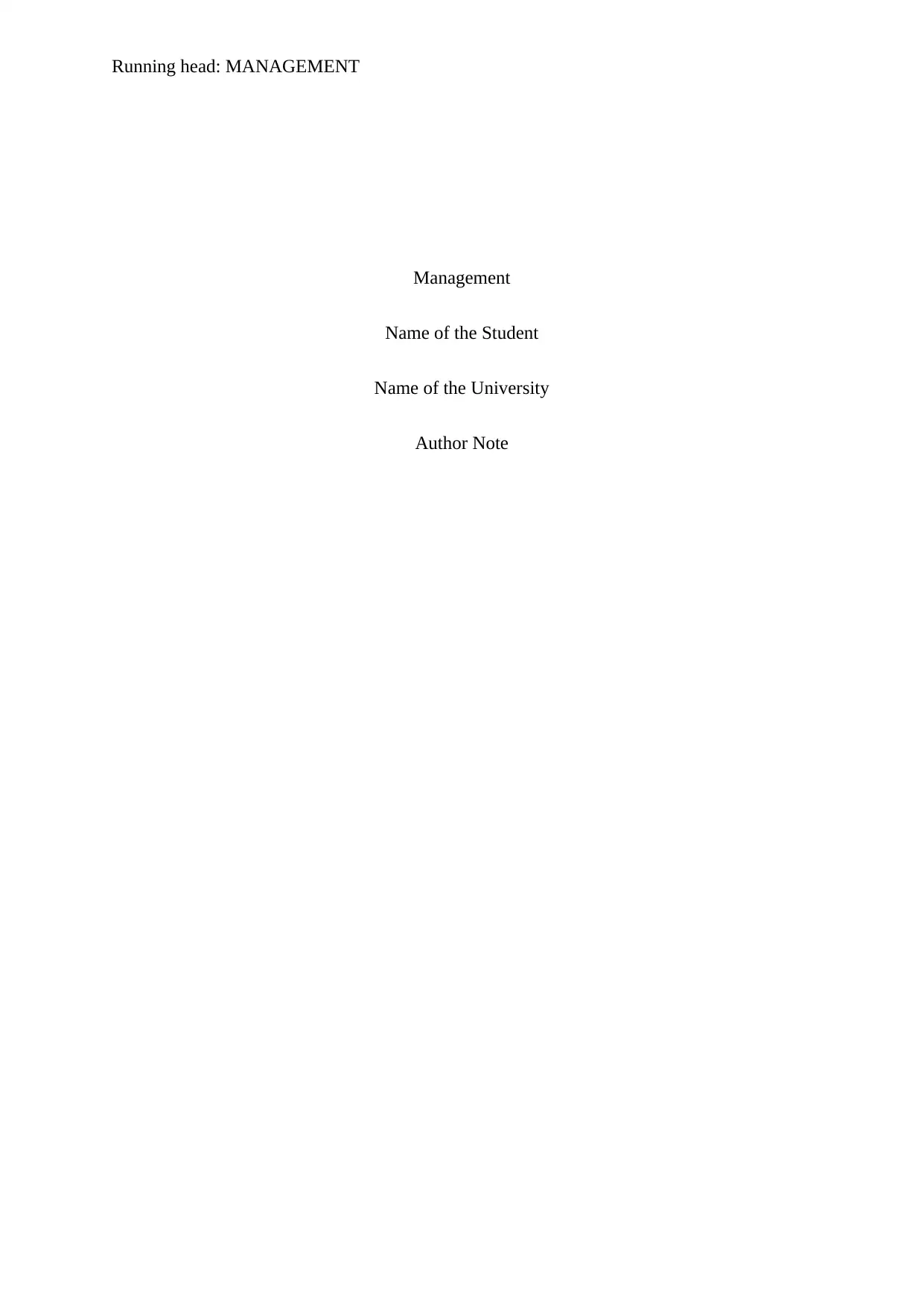
Running head: MANAGEMENT
Management
Name of the Student
Name of the University
Author Note
Management
Name of the Student
Name of the University
Author Note
Paraphrase This Document
Need a fresh take? Get an instant paraphrase of this document with our AI Paraphraser
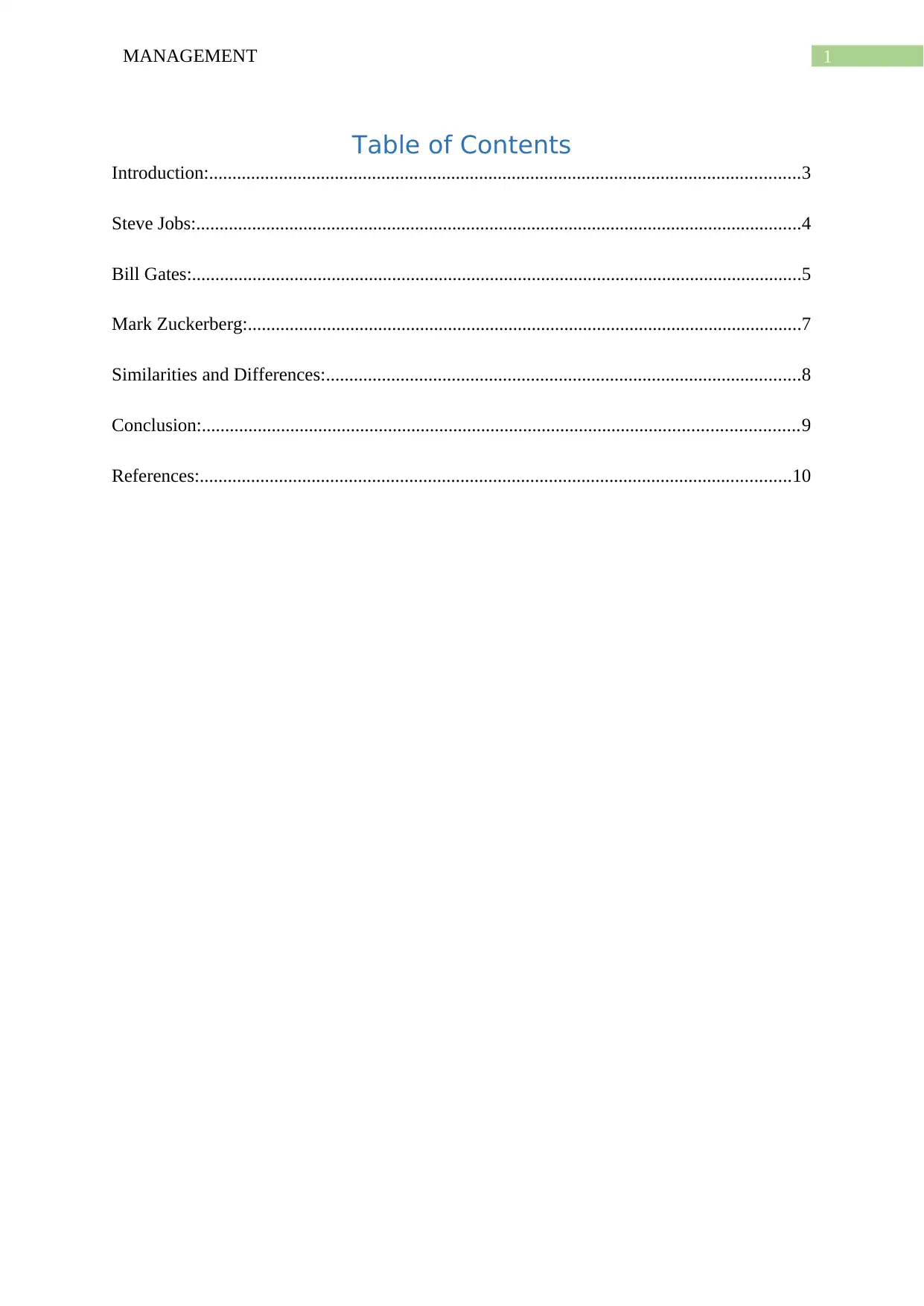
1MANAGEMENT
Table of Contents
Introduction:...............................................................................................................................3
Steve Jobs:..................................................................................................................................4
Bill Gates:...................................................................................................................................5
Mark Zuckerberg:.......................................................................................................................7
Similarities and Differences:......................................................................................................8
Conclusion:................................................................................................................................9
References:...............................................................................................................................10
Table of Contents
Introduction:...............................................................................................................................3
Steve Jobs:..................................................................................................................................4
Bill Gates:...................................................................................................................................5
Mark Zuckerberg:.......................................................................................................................7
Similarities and Differences:......................................................................................................8
Conclusion:................................................................................................................................9
References:...............................................................................................................................10
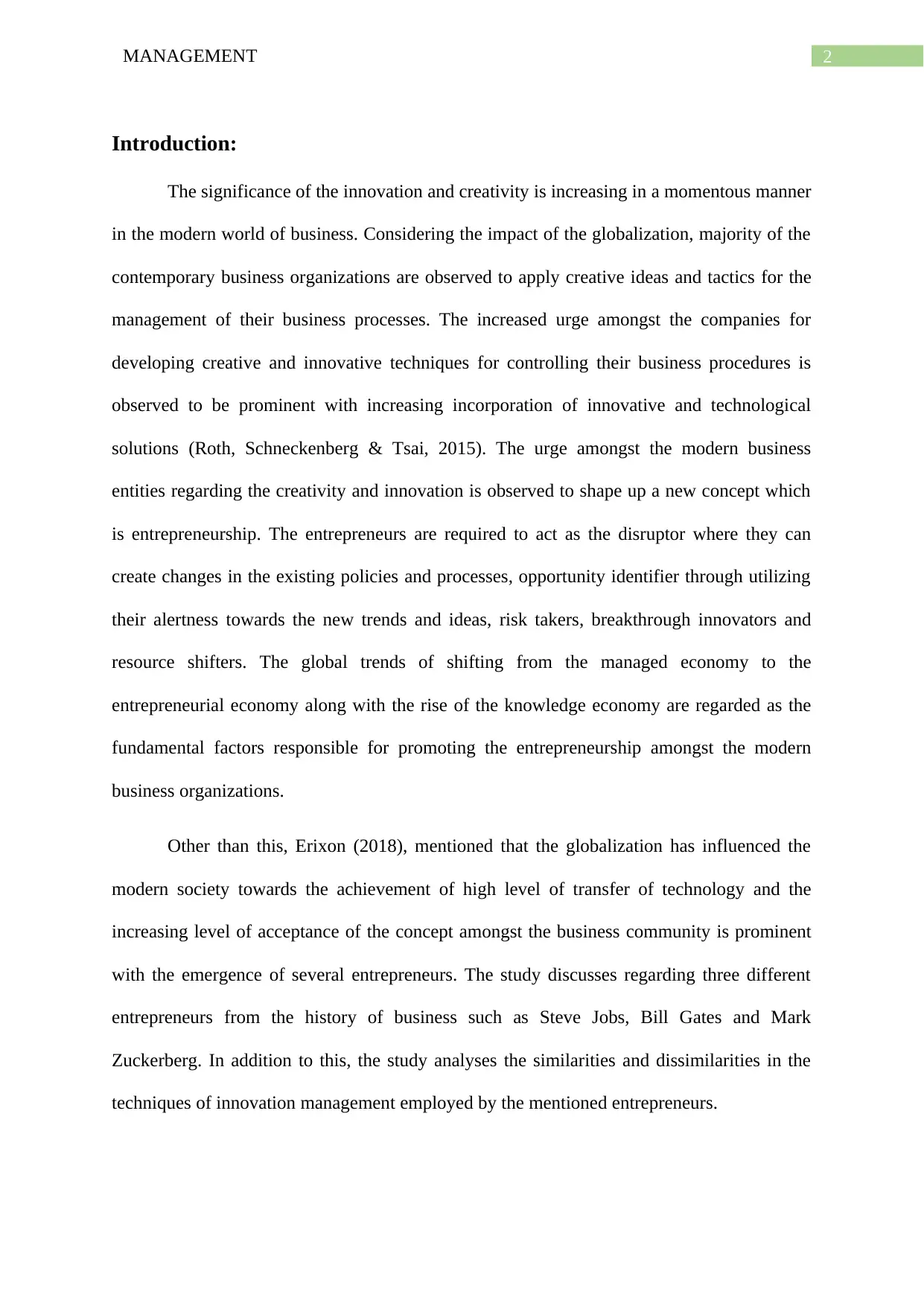
2MANAGEMENT
Introduction:
The significance of the innovation and creativity is increasing in a momentous manner
in the modern world of business. Considering the impact of the globalization, majority of the
contemporary business organizations are observed to apply creative ideas and tactics for the
management of their business processes. The increased urge amongst the companies for
developing creative and innovative techniques for controlling their business procedures is
observed to be prominent with increasing incorporation of innovative and technological
solutions (Roth, Schneckenberg & Tsai, 2015). The urge amongst the modern business
entities regarding the creativity and innovation is observed to shape up a new concept which
is entrepreneurship. The entrepreneurs are required to act as the disruptor where they can
create changes in the existing policies and processes, opportunity identifier through utilizing
their alertness towards the new trends and ideas, risk takers, breakthrough innovators and
resource shifters. The global trends of shifting from the managed economy to the
entrepreneurial economy along with the rise of the knowledge economy are regarded as the
fundamental factors responsible for promoting the entrepreneurship amongst the modern
business organizations.
Other than this, Erixon (2018), mentioned that the globalization has influenced the
modern society towards the achievement of high level of transfer of technology and the
increasing level of acceptance of the concept amongst the business community is prominent
with the emergence of several entrepreneurs. The study discusses regarding three different
entrepreneurs from the history of business such as Steve Jobs, Bill Gates and Mark
Zuckerberg. In addition to this, the study analyses the similarities and dissimilarities in the
techniques of innovation management employed by the mentioned entrepreneurs.
Introduction:
The significance of the innovation and creativity is increasing in a momentous manner
in the modern world of business. Considering the impact of the globalization, majority of the
contemporary business organizations are observed to apply creative ideas and tactics for the
management of their business processes. The increased urge amongst the companies for
developing creative and innovative techniques for controlling their business procedures is
observed to be prominent with increasing incorporation of innovative and technological
solutions (Roth, Schneckenberg & Tsai, 2015). The urge amongst the modern business
entities regarding the creativity and innovation is observed to shape up a new concept which
is entrepreneurship. The entrepreneurs are required to act as the disruptor where they can
create changes in the existing policies and processes, opportunity identifier through utilizing
their alertness towards the new trends and ideas, risk takers, breakthrough innovators and
resource shifters. The global trends of shifting from the managed economy to the
entrepreneurial economy along with the rise of the knowledge economy are regarded as the
fundamental factors responsible for promoting the entrepreneurship amongst the modern
business organizations.
Other than this, Erixon (2018), mentioned that the globalization has influenced the
modern society towards the achievement of high level of transfer of technology and the
increasing level of acceptance of the concept amongst the business community is prominent
with the emergence of several entrepreneurs. The study discusses regarding three different
entrepreneurs from the history of business such as Steve Jobs, Bill Gates and Mark
Zuckerberg. In addition to this, the study analyses the similarities and dissimilarities in the
techniques of innovation management employed by the mentioned entrepreneurs.
⊘ This is a preview!⊘
Do you want full access?
Subscribe today to unlock all pages.

Trusted by 1+ million students worldwide
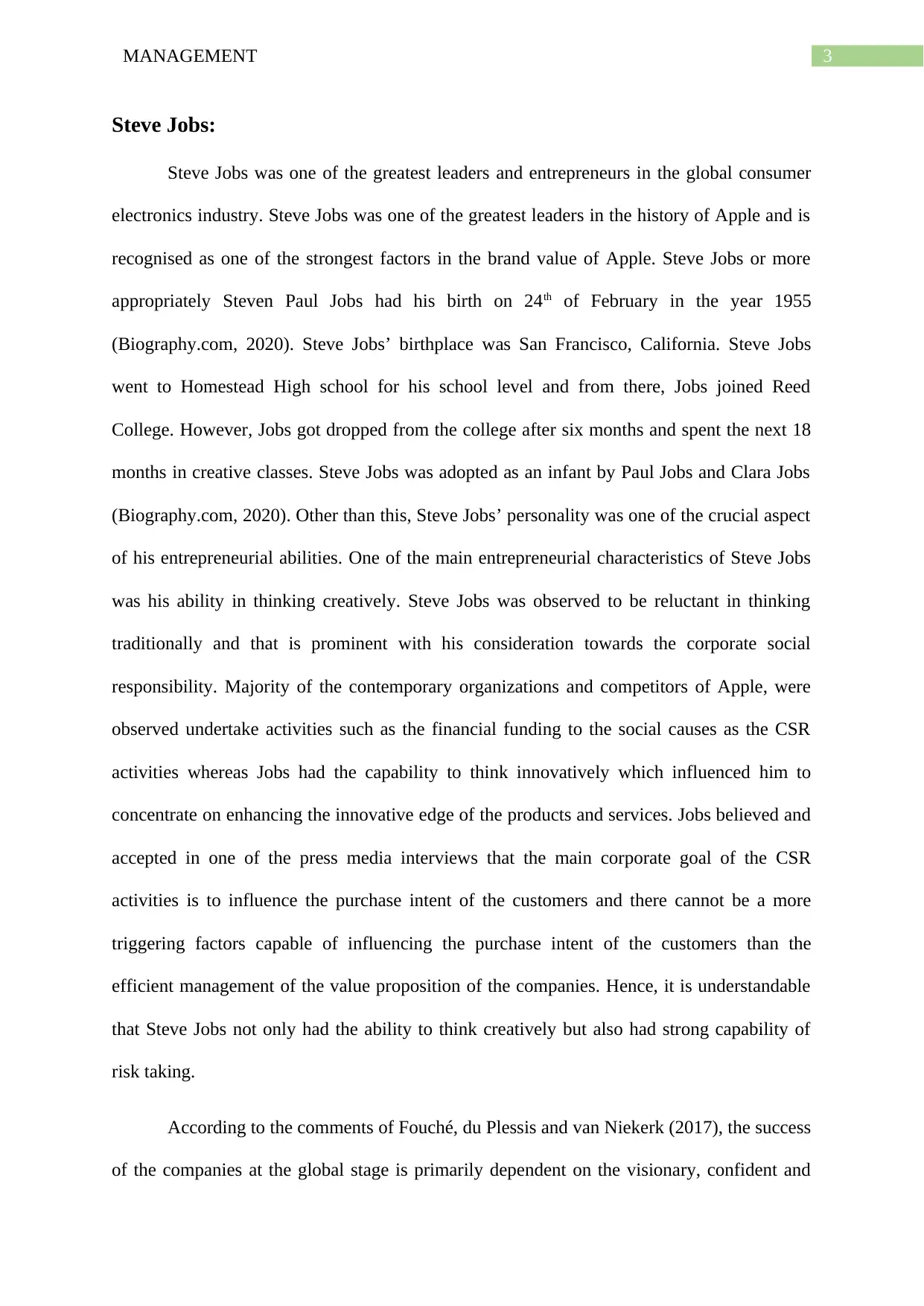
3MANAGEMENT
Steve Jobs:
Steve Jobs was one of the greatest leaders and entrepreneurs in the global consumer
electronics industry. Steve Jobs was one of the greatest leaders in the history of Apple and is
recognised as one of the strongest factors in the brand value of Apple. Steve Jobs or more
appropriately Steven Paul Jobs had his birth on 24th of February in the year 1955
(Biography.com, 2020). Steve Jobs’ birthplace was San Francisco, California. Steve Jobs
went to Homestead High school for his school level and from there, Jobs joined Reed
College. However, Jobs got dropped from the college after six months and spent the next 18
months in creative classes. Steve Jobs was adopted as an infant by Paul Jobs and Clara Jobs
(Biography.com, 2020). Other than this, Steve Jobs’ personality was one of the crucial aspect
of his entrepreneurial abilities. One of the main entrepreneurial characteristics of Steve Jobs
was his ability in thinking creatively. Steve Jobs was observed to be reluctant in thinking
traditionally and that is prominent with his consideration towards the corporate social
responsibility. Majority of the contemporary organizations and competitors of Apple, were
observed undertake activities such as the financial funding to the social causes as the CSR
activities whereas Jobs had the capability to think innovatively which influenced him to
concentrate on enhancing the innovative edge of the products and services. Jobs believed and
accepted in one of the press media interviews that the main corporate goal of the CSR
activities is to influence the purchase intent of the customers and there cannot be a more
triggering factors capable of influencing the purchase intent of the customers than the
efficient management of the value proposition of the companies. Hence, it is understandable
that Steve Jobs not only had the ability to think creatively but also had strong capability of
risk taking.
According to the comments of Fouché, du Plessis and van Niekerk (2017), the success
of the companies at the global stage is primarily dependent on the visionary, confident and
Steve Jobs:
Steve Jobs was one of the greatest leaders and entrepreneurs in the global consumer
electronics industry. Steve Jobs was one of the greatest leaders in the history of Apple and is
recognised as one of the strongest factors in the brand value of Apple. Steve Jobs or more
appropriately Steven Paul Jobs had his birth on 24th of February in the year 1955
(Biography.com, 2020). Steve Jobs’ birthplace was San Francisco, California. Steve Jobs
went to Homestead High school for his school level and from there, Jobs joined Reed
College. However, Jobs got dropped from the college after six months and spent the next 18
months in creative classes. Steve Jobs was adopted as an infant by Paul Jobs and Clara Jobs
(Biography.com, 2020). Other than this, Steve Jobs’ personality was one of the crucial aspect
of his entrepreneurial abilities. One of the main entrepreneurial characteristics of Steve Jobs
was his ability in thinking creatively. Steve Jobs was observed to be reluctant in thinking
traditionally and that is prominent with his consideration towards the corporate social
responsibility. Majority of the contemporary organizations and competitors of Apple, were
observed undertake activities such as the financial funding to the social causes as the CSR
activities whereas Jobs had the capability to think innovatively which influenced him to
concentrate on enhancing the innovative edge of the products and services. Jobs believed and
accepted in one of the press media interviews that the main corporate goal of the CSR
activities is to influence the purchase intent of the customers and there cannot be a more
triggering factors capable of influencing the purchase intent of the customers than the
efficient management of the value proposition of the companies. Hence, it is understandable
that Steve Jobs not only had the ability to think creatively but also had strong capability of
risk taking.
According to the comments of Fouché, du Plessis and van Niekerk (2017), the success
of the companies at the global stage is primarily dependent on the visionary, confident and
Paraphrase This Document
Need a fresh take? Get an instant paraphrase of this document with our AI Paraphraser
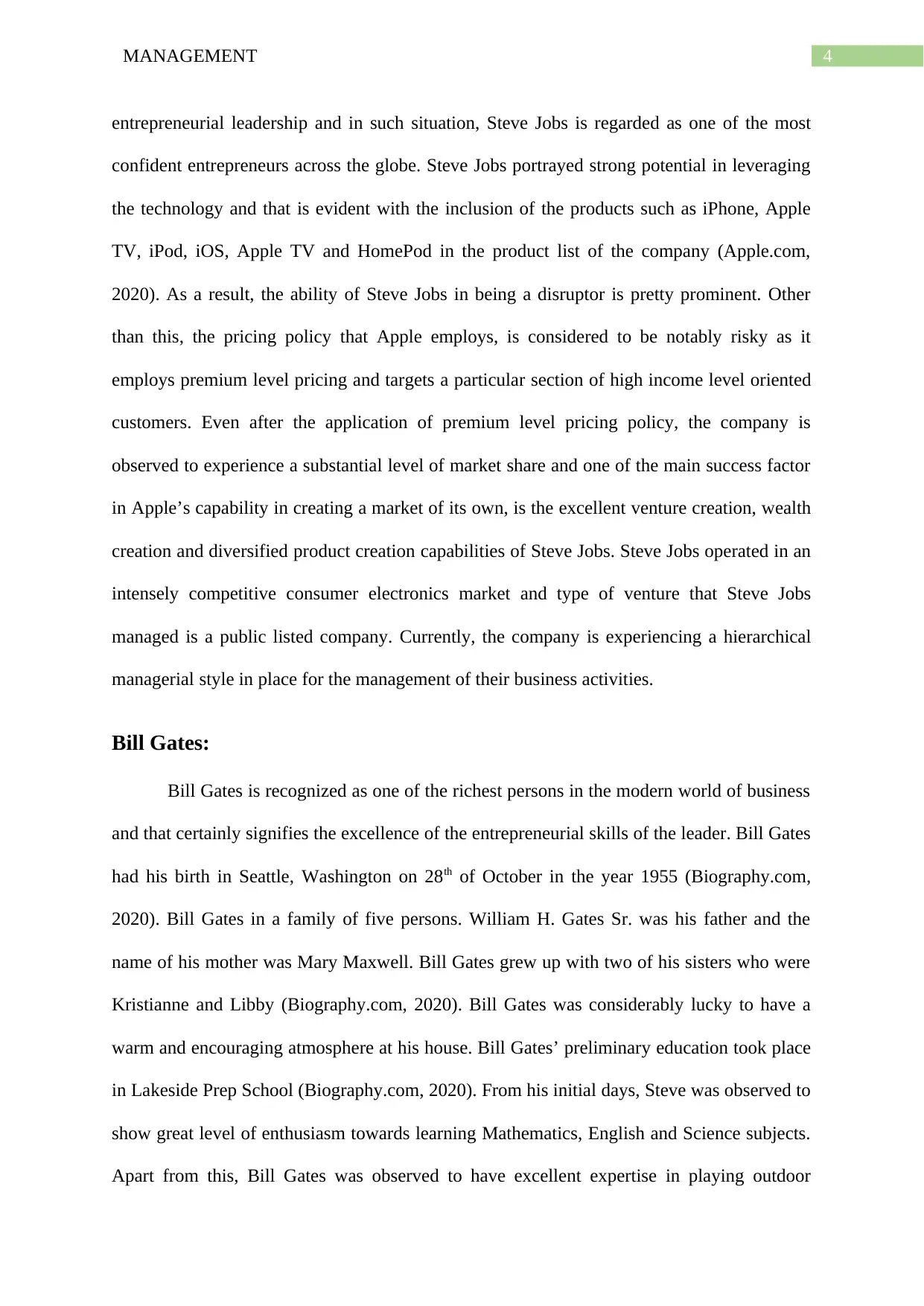
4MANAGEMENT
entrepreneurial leadership and in such situation, Steve Jobs is regarded as one of the most
confident entrepreneurs across the globe. Steve Jobs portrayed strong potential in leveraging
the technology and that is evident with the inclusion of the products such as iPhone, Apple
TV, iPod, iOS, Apple TV and HomePod in the product list of the company (Apple.com,
2020). As a result, the ability of Steve Jobs in being a disruptor is pretty prominent. Other
than this, the pricing policy that Apple employs, is considered to be notably risky as it
employs premium level pricing and targets a particular section of high income level oriented
customers. Even after the application of premium level pricing policy, the company is
observed to experience a substantial level of market share and one of the main success factor
in Apple’s capability in creating a market of its own, is the excellent venture creation, wealth
creation and diversified product creation capabilities of Steve Jobs. Steve Jobs operated in an
intensely competitive consumer electronics market and type of venture that Steve Jobs
managed is a public listed company. Currently, the company is experiencing a hierarchical
managerial style in place for the management of their business activities.
Bill Gates:
Bill Gates is recognized as one of the richest persons in the modern world of business
and that certainly signifies the excellence of the entrepreneurial skills of the leader. Bill Gates
had his birth in Seattle, Washington on 28th of October in the year 1955 (Biography.com,
2020). Bill Gates in a family of five persons. William H. Gates Sr. was his father and the
name of his mother was Mary Maxwell. Bill Gates grew up with two of his sisters who were
Kristianne and Libby (Biography.com, 2020). Bill Gates was considerably lucky to have a
warm and encouraging atmosphere at his house. Bill Gates’ preliminary education took place
in Lakeside Prep School (Biography.com, 2020). From his initial days, Steve was observed to
show great level of enthusiasm towards learning Mathematics, English and Science subjects.
Apart from this, Bill Gates was observed to have excellent expertise in playing outdoor
entrepreneurial leadership and in such situation, Steve Jobs is regarded as one of the most
confident entrepreneurs across the globe. Steve Jobs portrayed strong potential in leveraging
the technology and that is evident with the inclusion of the products such as iPhone, Apple
TV, iPod, iOS, Apple TV and HomePod in the product list of the company (Apple.com,
2020). As a result, the ability of Steve Jobs in being a disruptor is pretty prominent. Other
than this, the pricing policy that Apple employs, is considered to be notably risky as it
employs premium level pricing and targets a particular section of high income level oriented
customers. Even after the application of premium level pricing policy, the company is
observed to experience a substantial level of market share and one of the main success factor
in Apple’s capability in creating a market of its own, is the excellent venture creation, wealth
creation and diversified product creation capabilities of Steve Jobs. Steve Jobs operated in an
intensely competitive consumer electronics market and type of venture that Steve Jobs
managed is a public listed company. Currently, the company is experiencing a hierarchical
managerial style in place for the management of their business activities.
Bill Gates:
Bill Gates is recognized as one of the richest persons in the modern world of business
and that certainly signifies the excellence of the entrepreneurial skills of the leader. Bill Gates
had his birth in Seattle, Washington on 28th of October in the year 1955 (Biography.com,
2020). Bill Gates in a family of five persons. William H. Gates Sr. was his father and the
name of his mother was Mary Maxwell. Bill Gates grew up with two of his sisters who were
Kristianne and Libby (Biography.com, 2020). Bill Gates was considerably lucky to have a
warm and encouraging atmosphere at his house. Bill Gates’ preliminary education took place
in Lakeside Prep School (Biography.com, 2020). From his initial days, Steve was observed to
show great level of enthusiasm towards learning Mathematics, English and Science subjects.
Apart from this, Bill Gates was observed to have excellent expertise in playing outdoor
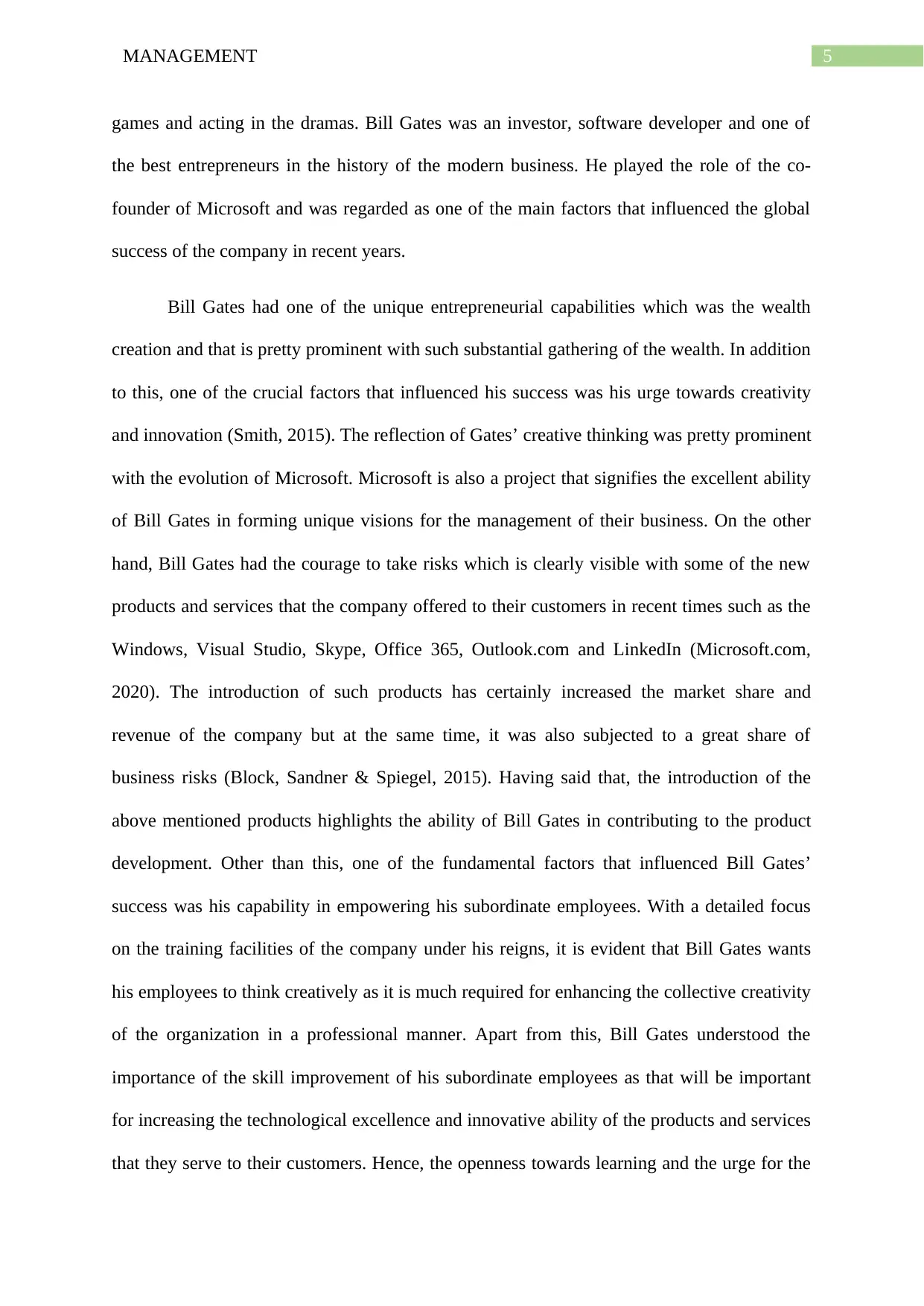
5MANAGEMENT
games and acting in the dramas. Bill Gates was an investor, software developer and one of
the best entrepreneurs in the history of the modern business. He played the role of the co-
founder of Microsoft and was regarded as one of the main factors that influenced the global
success of the company in recent years.
Bill Gates had one of the unique entrepreneurial capabilities which was the wealth
creation and that is pretty prominent with such substantial gathering of the wealth. In addition
to this, one of the crucial factors that influenced his success was his urge towards creativity
and innovation (Smith, 2015). The reflection of Gates’ creative thinking was pretty prominent
with the evolution of Microsoft. Microsoft is also a project that signifies the excellent ability
of Bill Gates in forming unique visions for the management of their business. On the other
hand, Bill Gates had the courage to take risks which is clearly visible with some of the new
products and services that the company offered to their customers in recent times such as the
Windows, Visual Studio, Skype, Office 365, Outlook.com and LinkedIn (Microsoft.com,
2020). The introduction of such products has certainly increased the market share and
revenue of the company but at the same time, it was also subjected to a great share of
business risks (Block, Sandner & Spiegel, 2015). Having said that, the introduction of the
above mentioned products highlights the ability of Bill Gates in contributing to the product
development. Other than this, one of the fundamental factors that influenced Bill Gates’
success was his capability in empowering his subordinate employees. With a detailed focus
on the training facilities of the company under his reigns, it is evident that Bill Gates wants
his employees to think creatively as it is much required for enhancing the collective creativity
of the organization in a professional manner. Apart from this, Bill Gates understood the
importance of the skill improvement of his subordinate employees as that will be important
for increasing the technological excellence and innovative ability of the products and services
that they serve to their customers. Hence, the openness towards learning and the urge for the
games and acting in the dramas. Bill Gates was an investor, software developer and one of
the best entrepreneurs in the history of the modern business. He played the role of the co-
founder of Microsoft and was regarded as one of the main factors that influenced the global
success of the company in recent years.
Bill Gates had one of the unique entrepreneurial capabilities which was the wealth
creation and that is pretty prominent with such substantial gathering of the wealth. In addition
to this, one of the crucial factors that influenced his success was his urge towards creativity
and innovation (Smith, 2015). The reflection of Gates’ creative thinking was pretty prominent
with the evolution of Microsoft. Microsoft is also a project that signifies the excellent ability
of Bill Gates in forming unique visions for the management of their business. On the other
hand, Bill Gates had the courage to take risks which is clearly visible with some of the new
products and services that the company offered to their customers in recent times such as the
Windows, Visual Studio, Skype, Office 365, Outlook.com and LinkedIn (Microsoft.com,
2020). The introduction of such products has certainly increased the market share and
revenue of the company but at the same time, it was also subjected to a great share of
business risks (Block, Sandner & Spiegel, 2015). Having said that, the introduction of the
above mentioned products highlights the ability of Bill Gates in contributing to the product
development. Other than this, one of the fundamental factors that influenced Bill Gates’
success was his capability in empowering his subordinate employees. With a detailed focus
on the training facilities of the company under his reigns, it is evident that Bill Gates wants
his employees to think creatively as it is much required for enhancing the collective creativity
of the organization in a professional manner. Apart from this, Bill Gates understood the
importance of the skill improvement of his subordinate employees as that will be important
for increasing the technological excellence and innovative ability of the products and services
that they serve to their customers. Hence, the openness towards learning and the urge for the
⊘ This is a preview!⊘
Do you want full access?
Subscribe today to unlock all pages.

Trusted by 1+ million students worldwide
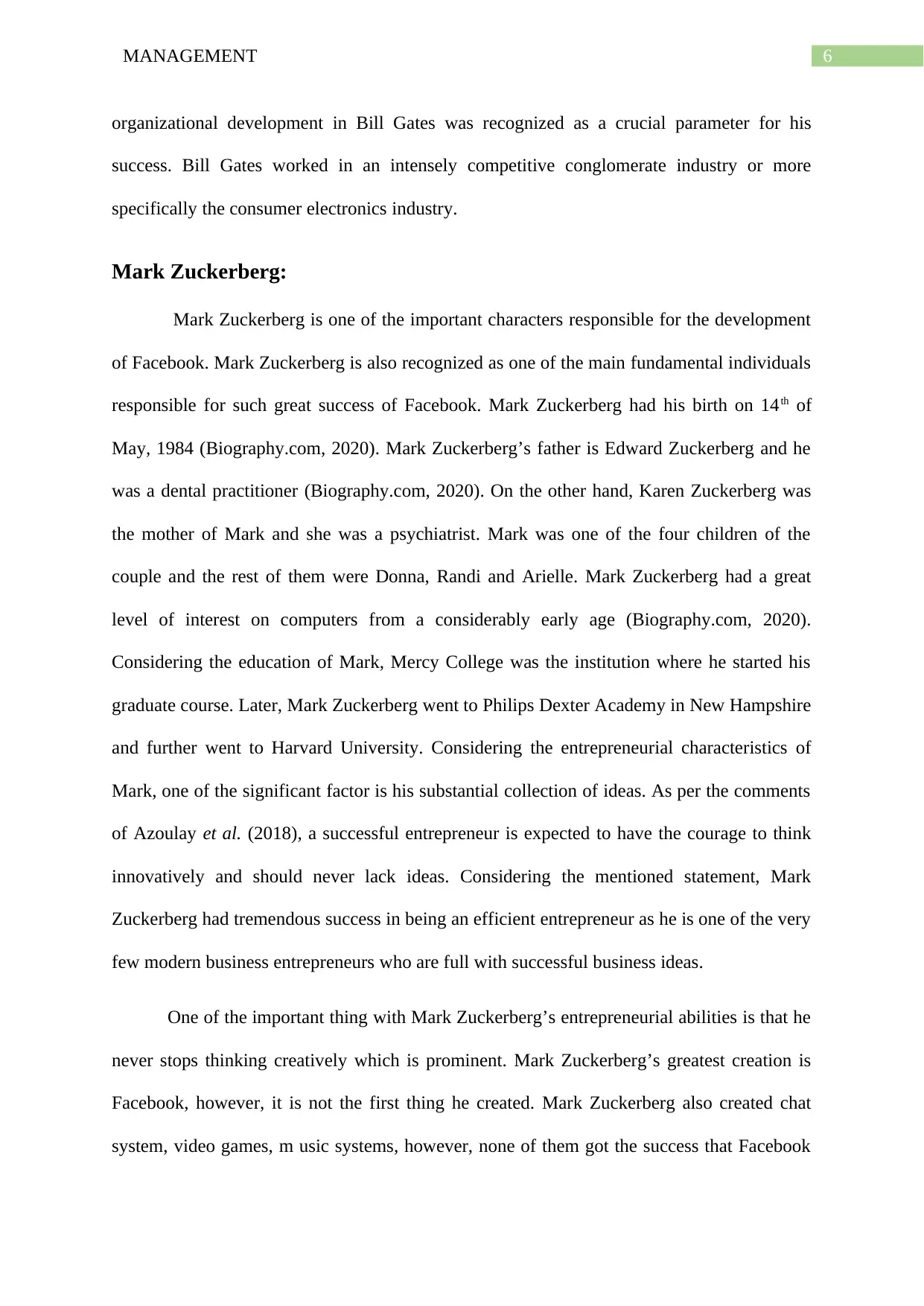
6MANAGEMENT
organizational development in Bill Gates was recognized as a crucial parameter for his
success. Bill Gates worked in an intensely competitive conglomerate industry or more
specifically the consumer electronics industry.
Mark Zuckerberg:
Mark Zuckerberg is one of the important characters responsible for the development
of Facebook. Mark Zuckerberg is also recognized as one of the main fundamental individuals
responsible for such great success of Facebook. Mark Zuckerberg had his birth on 14th of
May, 1984 (Biography.com, 2020). Mark Zuckerberg’s father is Edward Zuckerberg and he
was a dental practitioner (Biography.com, 2020). On the other hand, Karen Zuckerberg was
the mother of Mark and she was a psychiatrist. Mark was one of the four children of the
couple and the rest of them were Donna, Randi and Arielle. Mark Zuckerberg had a great
level of interest on computers from a considerably early age (Biography.com, 2020).
Considering the education of Mark, Mercy College was the institution where he started his
graduate course. Later, Mark Zuckerberg went to Philips Dexter Academy in New Hampshire
and further went to Harvard University. Considering the entrepreneurial characteristics of
Mark, one of the significant factor is his substantial collection of ideas. As per the comments
of Azoulay et al. (2018), a successful entrepreneur is expected to have the courage to think
innovatively and should never lack ideas. Considering the mentioned statement, Mark
Zuckerberg had tremendous success in being an efficient entrepreneur as he is one of the very
few modern business entrepreneurs who are full with successful business ideas.
One of the important thing with Mark Zuckerberg’s entrepreneurial abilities is that he
never stops thinking creatively which is prominent. Mark Zuckerberg’s greatest creation is
Facebook, however, it is not the first thing he created. Mark Zuckerberg also created chat
system, video games, m usic systems, however, none of them got the success that Facebook
organizational development in Bill Gates was recognized as a crucial parameter for his
success. Bill Gates worked in an intensely competitive conglomerate industry or more
specifically the consumer electronics industry.
Mark Zuckerberg:
Mark Zuckerberg is one of the important characters responsible for the development
of Facebook. Mark Zuckerberg is also recognized as one of the main fundamental individuals
responsible for such great success of Facebook. Mark Zuckerberg had his birth on 14th of
May, 1984 (Biography.com, 2020). Mark Zuckerberg’s father is Edward Zuckerberg and he
was a dental practitioner (Biography.com, 2020). On the other hand, Karen Zuckerberg was
the mother of Mark and she was a psychiatrist. Mark was one of the four children of the
couple and the rest of them were Donna, Randi and Arielle. Mark Zuckerberg had a great
level of interest on computers from a considerably early age (Biography.com, 2020).
Considering the education of Mark, Mercy College was the institution where he started his
graduate course. Later, Mark Zuckerberg went to Philips Dexter Academy in New Hampshire
and further went to Harvard University. Considering the entrepreneurial characteristics of
Mark, one of the significant factor is his substantial collection of ideas. As per the comments
of Azoulay et al. (2018), a successful entrepreneur is expected to have the courage to think
innovatively and should never lack ideas. Considering the mentioned statement, Mark
Zuckerberg had tremendous success in being an efficient entrepreneur as he is one of the very
few modern business entrepreneurs who are full with successful business ideas.
One of the important thing with Mark Zuckerberg’s entrepreneurial abilities is that he
never stops thinking creatively which is prominent. Mark Zuckerberg’s greatest creation is
Facebook, however, it is not the first thing he created. Mark Zuckerberg also created chat
system, video games, m usic systems, however, none of them got the success that Facebook
Paraphrase This Document
Need a fresh take? Get an instant paraphrase of this document with our AI Paraphraser
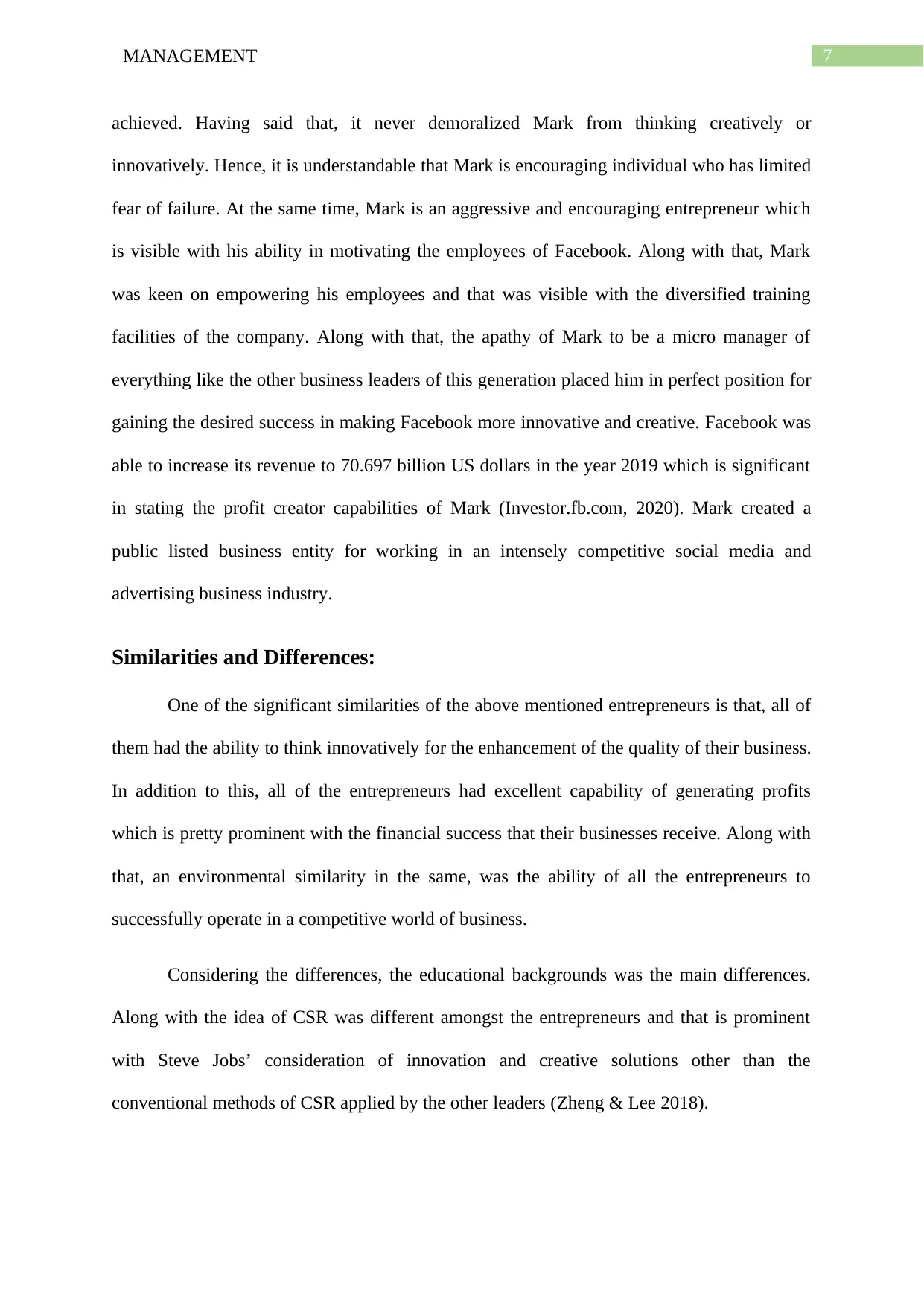
7MANAGEMENT
achieved. Having said that, it never demoralized Mark from thinking creatively or
innovatively. Hence, it is understandable that Mark is encouraging individual who has limited
fear of failure. At the same time, Mark is an aggressive and encouraging entrepreneur which
is visible with his ability in motivating the employees of Facebook. Along with that, Mark
was keen on empowering his employees and that was visible with the diversified training
facilities of the company. Along with that, the apathy of Mark to be a micro manager of
everything like the other business leaders of this generation placed him in perfect position for
gaining the desired success in making Facebook more innovative and creative. Facebook was
able to increase its revenue to 70.697 billion US dollars in the year 2019 which is significant
in stating the profit creator capabilities of Mark (Investor.fb.com, 2020). Mark created a
public listed business entity for working in an intensely competitive social media and
advertising business industry.
Similarities and Differences:
One of the significant similarities of the above mentioned entrepreneurs is that, all of
them had the ability to think innovatively for the enhancement of the quality of their business.
In addition to this, all of the entrepreneurs had excellent capability of generating profits
which is pretty prominent with the financial success that their businesses receive. Along with
that, an environmental similarity in the same, was the ability of all the entrepreneurs to
successfully operate in a competitive world of business.
Considering the differences, the educational backgrounds was the main differences.
Along with the idea of CSR was different amongst the entrepreneurs and that is prominent
with Steve Jobs’ consideration of innovation and creative solutions other than the
conventional methods of CSR applied by the other leaders (Zheng & Lee 2018).
achieved. Having said that, it never demoralized Mark from thinking creatively or
innovatively. Hence, it is understandable that Mark is encouraging individual who has limited
fear of failure. At the same time, Mark is an aggressive and encouraging entrepreneur which
is visible with his ability in motivating the employees of Facebook. Along with that, Mark
was keen on empowering his employees and that was visible with the diversified training
facilities of the company. Along with that, the apathy of Mark to be a micro manager of
everything like the other business leaders of this generation placed him in perfect position for
gaining the desired success in making Facebook more innovative and creative. Facebook was
able to increase its revenue to 70.697 billion US dollars in the year 2019 which is significant
in stating the profit creator capabilities of Mark (Investor.fb.com, 2020). Mark created a
public listed business entity for working in an intensely competitive social media and
advertising business industry.
Similarities and Differences:
One of the significant similarities of the above mentioned entrepreneurs is that, all of
them had the ability to think innovatively for the enhancement of the quality of their business.
In addition to this, all of the entrepreneurs had excellent capability of generating profits
which is pretty prominent with the financial success that their businesses receive. Along with
that, an environmental similarity in the same, was the ability of all the entrepreneurs to
successfully operate in a competitive world of business.
Considering the differences, the educational backgrounds was the main differences.
Along with the idea of CSR was different amongst the entrepreneurs and that is prominent
with Steve Jobs’ consideration of innovation and creative solutions other than the
conventional methods of CSR applied by the other leaders (Zheng & Lee 2018).
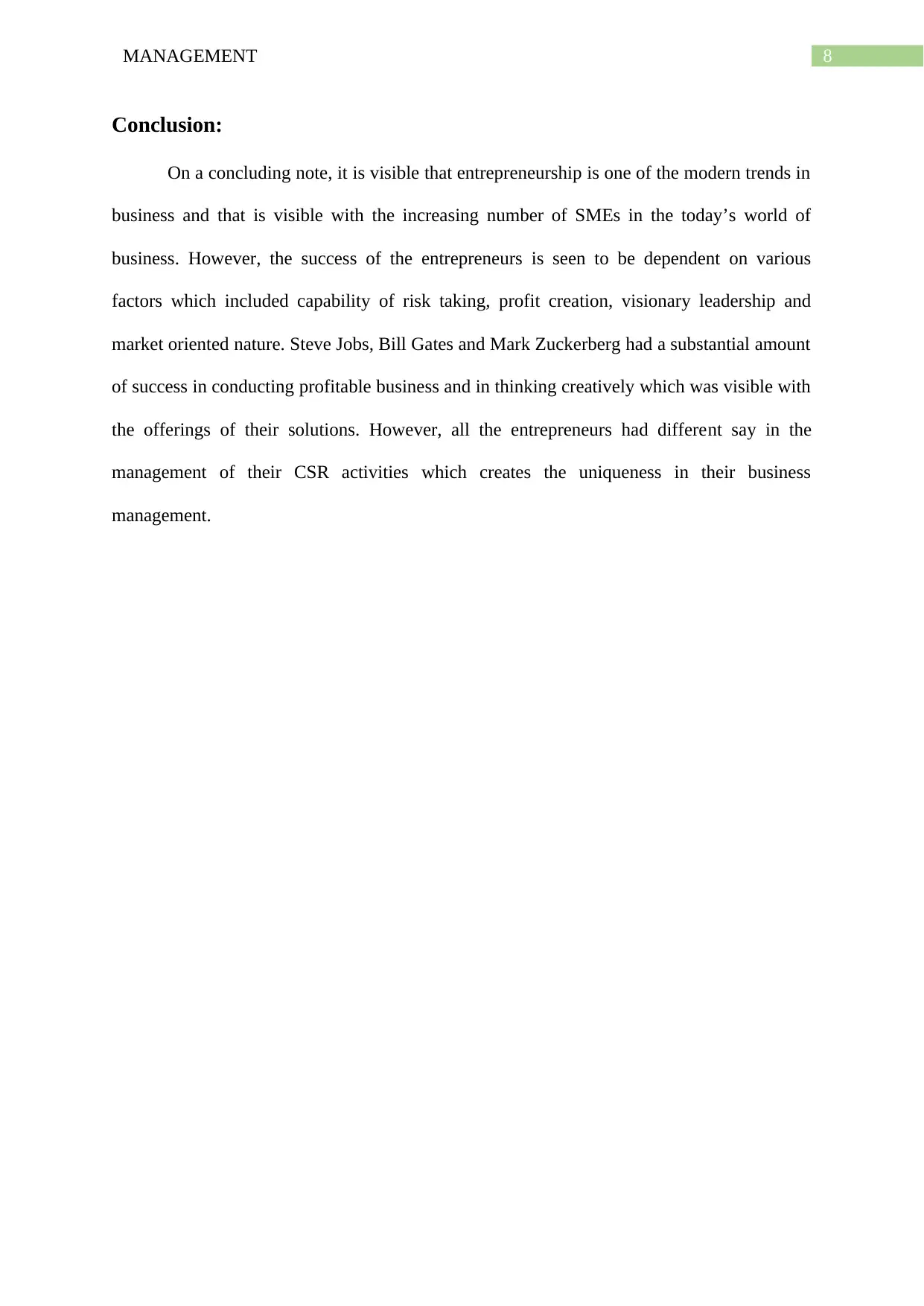
8MANAGEMENT
Conclusion:
On a concluding note, it is visible that entrepreneurship is one of the modern trends in
business and that is visible with the increasing number of SMEs in the today’s world of
business. However, the success of the entrepreneurs is seen to be dependent on various
factors which included capability of risk taking, profit creation, visionary leadership and
market oriented nature. Steve Jobs, Bill Gates and Mark Zuckerberg had a substantial amount
of success in conducting profitable business and in thinking creatively which was visible with
the offerings of their solutions. However, all the entrepreneurs had different say in the
management of their CSR activities which creates the uniqueness in their business
management.
Conclusion:
On a concluding note, it is visible that entrepreneurship is one of the modern trends in
business and that is visible with the increasing number of SMEs in the today’s world of
business. However, the success of the entrepreneurs is seen to be dependent on various
factors which included capability of risk taking, profit creation, visionary leadership and
market oriented nature. Steve Jobs, Bill Gates and Mark Zuckerberg had a substantial amount
of success in conducting profitable business and in thinking creatively which was visible with
the offerings of their solutions. However, all the entrepreneurs had different say in the
management of their CSR activities which creates the uniqueness in their business
management.
⊘ This is a preview!⊘
Do you want full access?
Subscribe today to unlock all pages.

Trusted by 1+ million students worldwide
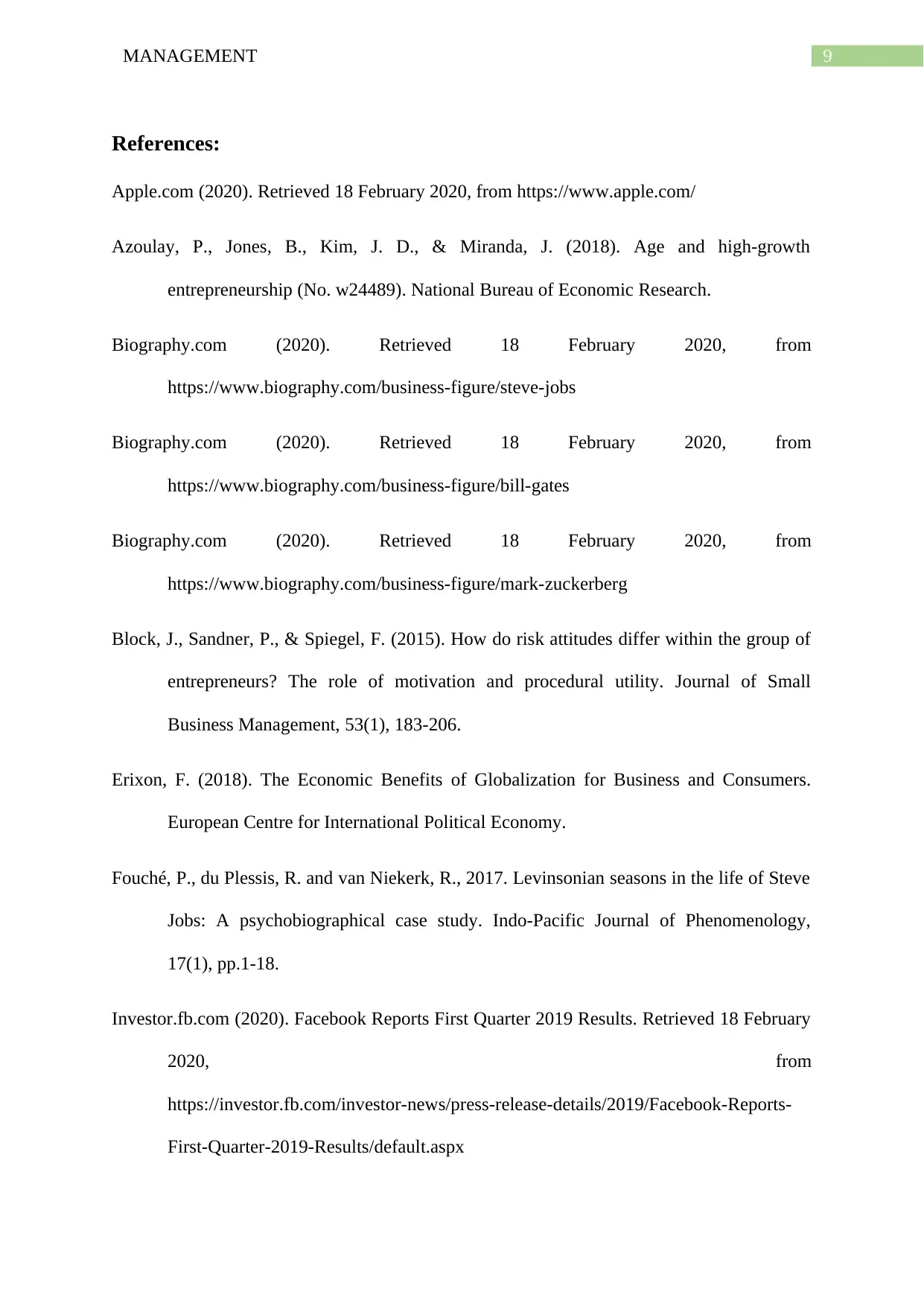
9MANAGEMENT
References:
Apple.com (2020). Retrieved 18 February 2020, from https://www.apple.com/
Azoulay, P., Jones, B., Kim, J. D., & Miranda, J. (2018). Age and high-growth
entrepreneurship (No. w24489). National Bureau of Economic Research.
Biography.com (2020). Retrieved 18 February 2020, from
https://www.biography.com/business-figure/steve-jobs
Biography.com (2020). Retrieved 18 February 2020, from
https://www.biography.com/business-figure/bill-gates
Biography.com (2020). Retrieved 18 February 2020, from
https://www.biography.com/business-figure/mark-zuckerberg
Block, J., Sandner, P., & Spiegel, F. (2015). How do risk attitudes differ within the group of
entrepreneurs? The role of motivation and procedural utility. Journal of Small
Business Management, 53(1), 183-206.
Erixon, F. (2018). The Economic Benefits of Globalization for Business and Consumers.
European Centre for International Political Economy.
Fouché, P., du Plessis, R. and van Niekerk, R., 2017. Levinsonian seasons in the life of Steve
Jobs: A psychobiographical case study. Indo-Pacific Journal of Phenomenology,
17(1), pp.1-18.
Investor.fb.com (2020). Facebook Reports First Quarter 2019 Results. Retrieved 18 February
2020, from
https://investor.fb.com/investor-news/press-release-details/2019/Facebook-Reports-
First-Quarter-2019-Results/default.aspx
References:
Apple.com (2020). Retrieved 18 February 2020, from https://www.apple.com/
Azoulay, P., Jones, B., Kim, J. D., & Miranda, J. (2018). Age and high-growth
entrepreneurship (No. w24489). National Bureau of Economic Research.
Biography.com (2020). Retrieved 18 February 2020, from
https://www.biography.com/business-figure/steve-jobs
Biography.com (2020). Retrieved 18 February 2020, from
https://www.biography.com/business-figure/bill-gates
Biography.com (2020). Retrieved 18 February 2020, from
https://www.biography.com/business-figure/mark-zuckerberg
Block, J., Sandner, P., & Spiegel, F. (2015). How do risk attitudes differ within the group of
entrepreneurs? The role of motivation and procedural utility. Journal of Small
Business Management, 53(1), 183-206.
Erixon, F. (2018). The Economic Benefits of Globalization for Business and Consumers.
European Centre for International Political Economy.
Fouché, P., du Plessis, R. and van Niekerk, R., 2017. Levinsonian seasons in the life of Steve
Jobs: A psychobiographical case study. Indo-Pacific Journal of Phenomenology,
17(1), pp.1-18.
Investor.fb.com (2020). Facebook Reports First Quarter 2019 Results. Retrieved 18 February
2020, from
https://investor.fb.com/investor-news/press-release-details/2019/Facebook-Reports-
First-Quarter-2019-Results/default.aspx
Paraphrase This Document
Need a fresh take? Get an instant paraphrase of this document with our AI Paraphraser
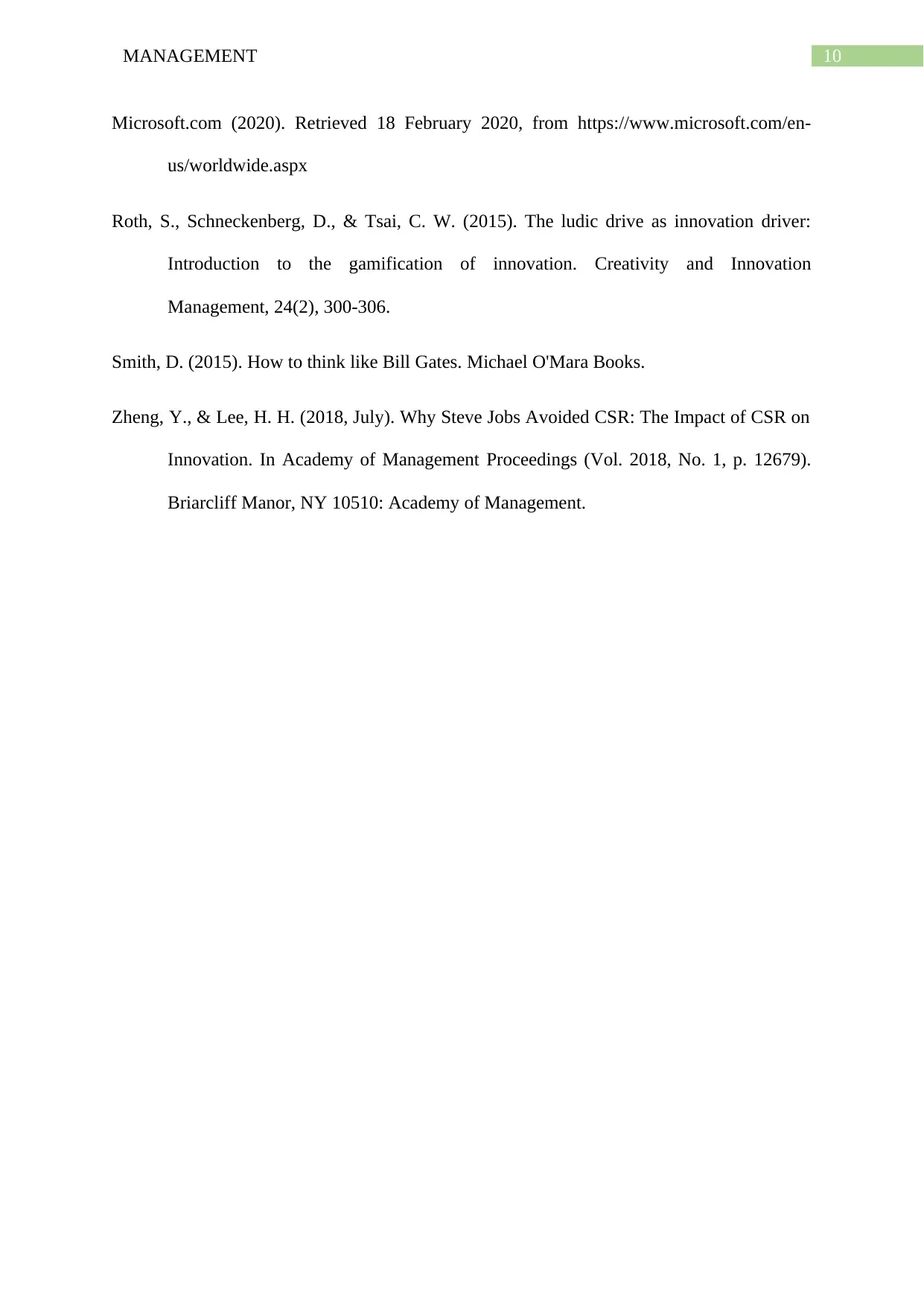
10MANAGEMENT
Microsoft.com (2020). Retrieved 18 February 2020, from https://www.microsoft.com/en-
us/worldwide.aspx
Roth, S., Schneckenberg, D., & Tsai, C. W. (2015). The ludic drive as innovation driver:
Introduction to the gamification of innovation. Creativity and Innovation
Management, 24(2), 300-306.
Smith, D. (2015). How to think like Bill Gates. Michael O'Mara Books.
Zheng, Y., & Lee, H. H. (2018, July). Why Steve Jobs Avoided CSR: The Impact of CSR on
Innovation. In Academy of Management Proceedings (Vol. 2018, No. 1, p. 12679).
Briarcliff Manor, NY 10510: Academy of Management.
Microsoft.com (2020). Retrieved 18 February 2020, from https://www.microsoft.com/en-
us/worldwide.aspx
Roth, S., Schneckenberg, D., & Tsai, C. W. (2015). The ludic drive as innovation driver:
Introduction to the gamification of innovation. Creativity and Innovation
Management, 24(2), 300-306.
Smith, D. (2015). How to think like Bill Gates. Michael O'Mara Books.
Zheng, Y., & Lee, H. H. (2018, July). Why Steve Jobs Avoided CSR: The Impact of CSR on
Innovation. In Academy of Management Proceedings (Vol. 2018, No. 1, p. 12679).
Briarcliff Manor, NY 10510: Academy of Management.
1 out of 11
Related Documents
Your All-in-One AI-Powered Toolkit for Academic Success.
+13062052269
info@desklib.com
Available 24*7 on WhatsApp / Email
![[object Object]](/_next/static/media/star-bottom.7253800d.svg)
Unlock your academic potential
Copyright © 2020–2026 A2Z Services. All Rights Reserved. Developed and managed by ZUCOL.




